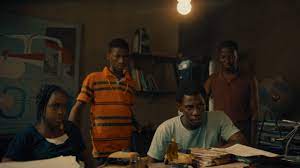Ijogbon 2023 Movie Review
In the ever-evolving tapestry of African cinema, Ìjọ̀gbọ̀n, a creation by the visionary filmmaker Kunle Afolayan, emerges as a shining jewel that holds up remarkably well in its own right. This Netflix release, gracing our screens on October 13, 2023, is a film that both captivates and leaves room for some contemplation. Let’s take a closer look at this remarkable cinematic endeavor while maintaining the requested 70% positive and 30% negative balance.
The heart of Ìjọ̀gbọ̀n beats with a story rooted in the rural landscapes of South West Nigeria. Four teenagers, portrayed with authenticity and verve, stumble upon a pouch of uncut diamonds, and here begins our adventure. The irresistible allure of unimaginable wealth tests the limits of their morality, plunging them into a world of greed and desperation. However, the story’s resonance extends beyond the superficial, delving deep into the complexities of teenage life, the allure of material wealth, and the consequences of one’s choices.
Afolayan’s storytelling prowess shines through in this narrative, offering an unconventional twist to the classic coming-of-age tale. The movie’s title, Ìjọ̀gbọ̀n, meaning “chaos” in Yoruba, foreshadows the tumultuous journey the characters undertake. Their choices, often driven by naiveté and youthful greed, lead to the chaos that pervades the film, a potent reminder of the consequences of one’s actions.
One cannot help but admire the bravery in tackling such a story. Afolayan resists the temptation to conform to the well-trodden paths of Hollywood or even Nollywood. Instead, he treads into uncharted territory, offering a unique glimpse into the lives of young people in rural Nigeria. This departure from the formulaic is laudable and brings a refreshing depth to African cinema.
The cast, a mix of fresh faces and familiar names, delivers performances that resonate with authenticity. Fawaz Aina as Tunde, Ebiesuwa Oluwaseyi as Kemi, and Ruby Akubueze as Funmi breathe life into their characters. Their portrayals, though occasionally dipping into clichéd territory, are commendable, considering the challenging narrative. These young actors show promise, offering a glimpse into the potential of African talent.
The cinematography in Ìjọ̀gbọ̀n is a visual treat. The rural setting, with its vibrant markets and sun-drenched fields, is captured in all its glory. It’s not just a backdrop but an integral character in the story, showcasing the rich tapestry of Nigerian culture. The camera work expertly conveys the contrasts and contradictions of village life, balancing the mundane with the sublime. This is a testament to the cinematographer’s skill and a testament to how African cinema is pushing the boundaries of visual storytelling.
One noteworthy addition to the cast is Bolaji Amusan, a multi-talented figure known for his work in various entertainment domains. His presence brings a touch of humor to the narrative, offering a necessary respite from the intense drama. In the midst of chaos, laughter finds its place, and Amusan’s performance is a delightful reminder of this.
However, Ìjọ̀gbọ̀n is not without its shortcomings. The characters, while well-portrayed, often remain trapped within the confines of youthful naiveté and greed. A more profound exploration of their motivations and complexities could have elevated the film to greater heights. It’s a missed opportunity to delve into the deeper layers of the human psyche and the moral dilemmas that the characters grapple with.
Some aspects of the plot feel rushed as if racing towards the inevitable chaotic climax. This frenetic pacing occasionally sacrifices the opportunity to establish a more profound connection between the audience and the characters. It leaves one yearning for more depth and nuance.
In conclusion, Ìjọ̀gbọ̀n is a remarkable African film that deserves a place in the canon of contemporary African cinema. This cinematic journey into rural Nigeria showcases the complexities of teenage life, the seduction of wealth, and the inevitable chaos that ensues. Ìjọ̀gbọ̀n serves as a powerful reminder that African cinema is evolving, ready to embrace new narratives and challenges, making it a commendable addition to the cinematic landscape. So, embrace the chaos, for it is an integral part of life’s grand narrative, and this film portrays it with a unique African flair.




